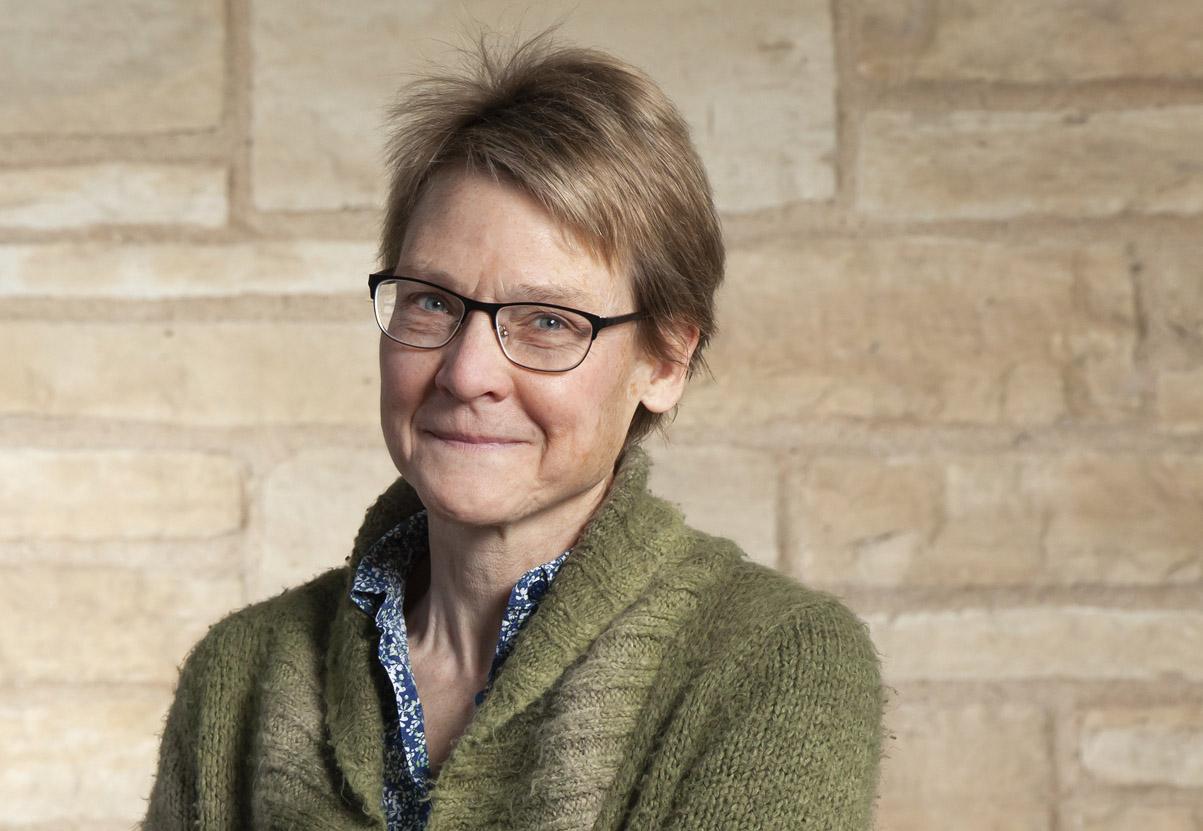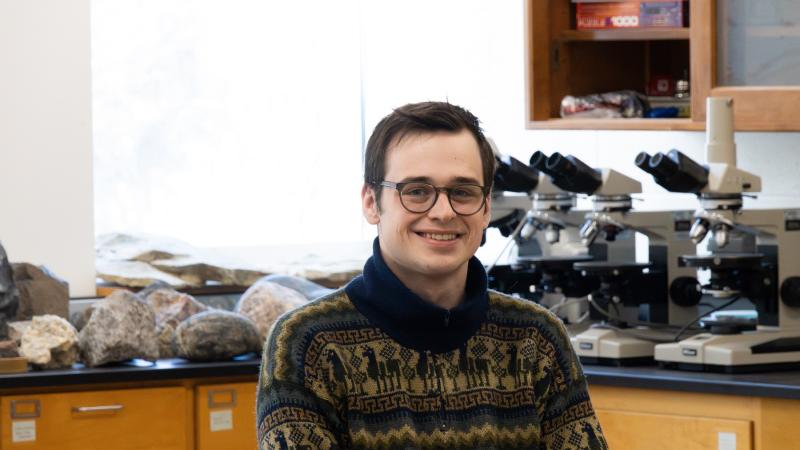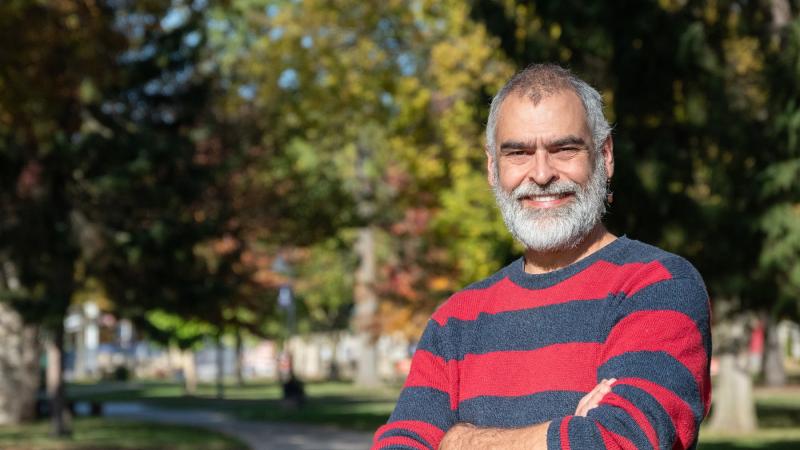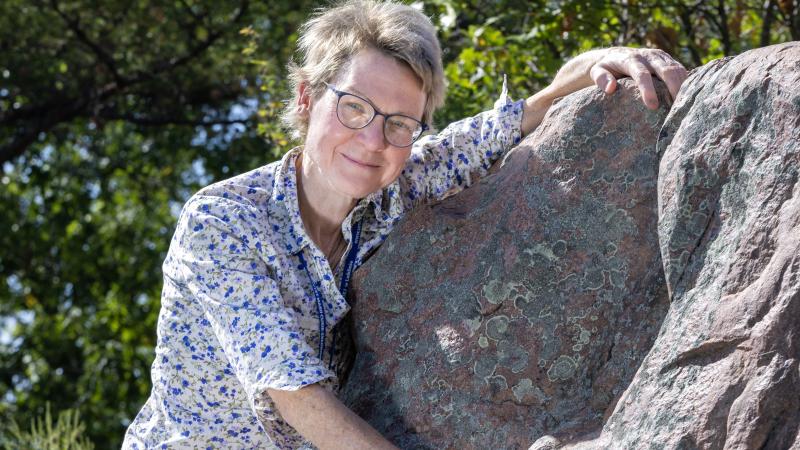About the series: On Main Hall Green With … is an opportunity to connect with faculty on things in and out of the classroom. We’re featuring a different Lawrence faculty member each time — same questions, different answers.
---
Marcia Bjornerud’s deep interest in the Earth—what rock formations tell us about the health of our planet and its history, for example—has led to scholarly work that has drawn accolades far and wide since she joined the Lawrence faculty in 1995.
The Walter Schober Professor of Environmental Studies and professor of geology has become a sought-after writer on a range of geology topics, her work appearing in the New Yorker and the Wall Street Journal, among other publications.
She’s drawn rave reviews for her books, including 2005’s Reading the Rocks: The Autobiography of the Earth and 2018’s Timefulness: How Thinking Like a Geologist Can Help Save the World, the latter named to the 2019 Phi Beta Kappa Book Awards Short List and selected as a finalist for the Los Angeles Times Book Prize in the category of Science and Technology.
She was named a Fellow of the Wisconsin Academy of Sciences, Arts & Letters (2016), was named a Fellow of the Geological Society of America (2003), and twice was named a Fulbright Senior Scholar, first in Norway (2000-01) and then New Zealand (2009). She was named Outstanding Educator by the Association of Women Geoscientists (2011) and was recognized with Lawrence’s Excellence in Scholarship or Creative Activity Award (2007).
Bjornerud was the founding director of Lawrence’s degree-granting program in environmental studies and helped in the creation of the newly launched environmental science major.
She earned a bachelor’s degree in geophysics from the University of Minnesota and master’s and doctoral degrees in structural geology from the University of Wisconsin-Madison.
We caught up with her to talk about her interests in and out of the classroom:
In the classroom
Inside info: What’s one thing you want every student coming into your classes to know about you?
I have high expectations for students, and the demands of labs, exams etc. no doubt loom large for those in my classes. But I hope students recognize that my earnest aspiration is simply to help my fellow Earthlings understand how their planet works. Why? Because this is urgently important to the future of humanity.
I’d also like students to know that besides being a professor, I’m a mother of three sons in their 20s and have great empathy for the challenges and stresses of early adulthood in these times.
Getting energized: What work have you done or will you be doing at Lawrence that gets you the most excited?
Some of my fondest Lawrence memories, and things I look forward to again in post-pandemic times, are field trips and field courses with students to places near and far—the Upper Peninsula of Michigan, northern Minnesota, western Ontario, the southern Appalachians, the Montana Rockies, Scotland, Italy and elsewhere. Because I was a single parent, my kids came on many such trips when they were young, so these adventures are family memories as well. Doing geology in the field, with nature as the authoritative textbook, is the very best way to develop a deep understanding of the earth and its immensely complex, interconnected systems.
Going places: Is there an example of somewhere your career has taken you (either a physical space or something more intellectual, emotional or spiritual) that took you by surprise?
I’ve had the privilege as a geologist of traveling to fairly inaccessible places in the high Arctic (northernmost Ellesmere Island in Canada and protected parts of Svalbard). Since I’ve been at Lawrence, I’ve also been lucky enough to have sabbaticals—again with my kids along—in Norway and New Zealand. But perhaps the most important way my “life itinerary” has changed since I came to Lawrence has been discovering my voice as a science writer. My academic scope has been greatly expanded by immersion in the liberal arts environment at Lawrence, and in particular by teaching First-Year Studies, which initially terrified me as a bachelor of science graduate in geophysics who had barely taken any humanities courses in college. I can safely say that I would not have written my books Reading the Rocks and Timefulness nor had a stint as a contributing writer for the New Yorker if I hadn’t come to Lawrence.
Out of the classroom
This or that: If you weren’t teaching for a living, what would you be doing?
I’d be on the shores of Lake Superior looking at rocks, picking wild berries and cross-country skiing according to the season—but wait, I guess nobody would pay me to do that.
Right at home: Whether for work, relaxation or reflection, what’s your favorite spot on campus?
I live not far from Alexander Gym, and in the winter, if there is too much snow for me to bike to campus, I walk to work via a path near the gym down to the river. On the way, I pass through the grove of old white oaks just west of the former soccer field. I think those oaks are among the oldest in the city, probably older even than Lawrence. Every time I walk under those trees, I say a word of gratitude for them.
One book, one recording, one film: Name one of each that speaks to your soul? Or you would recommend to a friend? Or both?
Just one of each? I’ll stretch the definition of a “book” a little and say the collected works of Louise Erdrich, an Ojibwe writer from North Dakota and Minnesota. Many of her books are in a sense one large book, the stories of multiple generations of the same interconnected families, a tangled skein of characters linked through time. Her novels have an evolutionary, almost geological, sensibility, which obviously appeals to me. But that would feel cold and analytical without Erdrich’s extraordinary capacity for empathy—her deep insight into the interior lives of so many different kinds of people—which makes her characters from a reservation in North Dakota feel like a microcosm of all of humanity.
Recording: The Beatles’ Sergeant Peppers album. I actually remember my dad buying the record when it first came out in 1967. Its exuberant, non-formulaic creativity stands as an inspiration whenever the forces of conformity seem to be closing in.
Film: Akira Kurosawa’s Dersu Uzala (1975). Set in the Russian far east in the first decades of the 1900s, it’s based on a true story of the friendship between a native hunter (Dersu) and a Russian surveyor (Arsenyev) charged with mapping the remote territory. Arsenyev respects Dersu’s deep understanding of the harsh but magnificent landscape, which is as much a protagonist as the human characters. The two don’t even share a language but grow to truly love each other across vast cultural differences. The film is also about the discord between the cyclical, continuously renewing character of natural processes vs. the irrevocable industrial alteration of landscapes. And it’s simply beautiful to watch.




